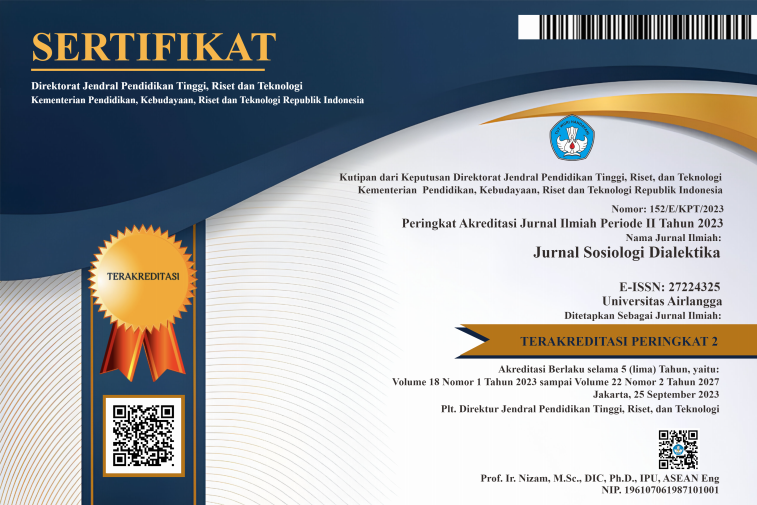Level of family support for university students during the COVID-19 pandemic: A case study among students at the University of Malaya, Malaysia
Downloads
The COVID-19 pandemic has not only brought major changes to the survival of society at large. The spread of this virus also specifically has an impact on university students who are at home during the quarantine period. This study aims to identify the level of family support among the University of Malaya students. This study used a quantitative research method, with 103 respondents/university students from eight faculties at the University of Malaya. Researchers used a quantitative approach to analyze the information data obtained from respondents. In this study, the collected data were analyzed through descriptive analysis methods to determine the level of family support. The results showed that the level of family support was moderate. This shows that the role of the family is also very important for university students during the COVID-19 pandemic. The family is the basis on which individuals depend for survival, where their basic functions include preparing an environment and situation that is suitable for the development of healthy family members physically, mentally, socially, and so on. This study concludes that family presence not only directly influences various aspects of child socialization but also has an important influence on individual mental health.
Atkeson A (2020) What will be the economic impact of the COVID-19 bonus? Rough estimates of disease scenarios. NBER Working Paper Series, No. 26867.
Baker SR, Bloom N, Davis SJ, & Terry SJ (2020) Covid-induced economic uncertainty. NBER Working Paper Series, No. 26983.
Brooks SK, Webster RK, Smith LE, Woodland L, Wessely S, & Greenberg N (2020) The psychological impact of quarantine and how to reduce it: a rapid review of the evidence. Lancet 395: 912-920. https://doi.org/10.1016/S0140-6736(20)30460-8.
Bryman A & Cramer D (2011) Quantitative data Analysis with IBM SPSS version 17, 18 & 19. A guide for social scientists. Padstow, Cornwall: TJ International Ltd.
Cao W, Fang Z, Hou G, Han M, Xu X, Dong J (2020) The psychological impact of the COVID-19 epidemic on college students in China. Psychiatry Research 287: 112934. https://doi.org/10.1016/j.psychres.2020.112934.
Chen B, Sun J, & Feng Y (2020) How have COVID-19 isolation policies affecting young people's mental health? - Evidence from Chinese college students. Frontiers in Psychology 11: 1529. https://doi.org/10.3389/fpsyg.2020.01529.
Dornbusch SM, Ritter PL, Mont-Reynaud R, & Chen Z (1990) Family decision making and academic performance in a diverse high school population. Journal Adolescents Research 5 (2):143-160. https://doi.org/10.1177/074355489052003.
Dunst CJ, Jenkins V, & Trivette CM (1984) Reliability and validity. Journal of Individual, Family, and Community Wellness 45-52.
Elengoe A (2020) COVID-19 outbreak in Malaysia. Osong public health and research perspectives 11 (3):93-100.
Eva N, Parameitha DD, Farah FAM, & Nurfitriana F (2020) Academic resilience and subjective wellbeing amongst college students using online learning during the COVID-19 pandemic. KnE Social Sciences 202-214.
Fauziah PY, Izzaty RE, & Kusumawardani E (2022) Child nurture and learning assistance for children in the family during the COVID-19 pandemic. Jurnal Obsesi: Jurnal Pendidikan Anak Usia Dini 6 (3):2258-2265.
Fernandes N (2020) Economic effects of coronavirus outbreak (COVID-19) on the world economy. https://dx.doi.org/10.2139/ssrn.3557504.
Hadi P (2020) Study from home in the middle of the COVID-19 pandemic analysis of religiosity, teacher, and parents support against academic stress. Talent Development & Excellence 12 (2):1791-1807.
Hado E & Friss Feinberg L (2020) Amid the COVID-19 pandemic, meaningful communication between family caregivers and residents of long-term care facilities is imperative. Journal of aging & social policy 32 (4-5):410-415.
Hall RE, Jones CI, & Klenow PJ (2020) Trading off consumption and COVID-19 deaths. Stanford University and NBER. http://klenow.com/Consumption_vs_COVID19.pdf.
Hatw MME, Taher AAE, Hamidi AE, & Alturkait FA (2015) The association of exposure to the 2009 south war with the physical, psychological, and family well-being of Saudi children. SMJ. 36 (1):73-81. https://doi.org/10.15537/smj.2015.1.9494.
Jiang F, Deng L, Zhang L, Cai Y, Cheung CW, & Xia Z (2020) Review of the clinical characteristics of coronavirus disease 2019 (COVID-19). Journal of general internal medicine 35: 1545-1549.
Lanozo JG, Tabieros L, Solmiano EL, Paras N, & Tus J (2021) Buhay estudyante: The lives of students from broken families amidst the pandemic. International Journal of Advance Research and Innovative Ideas in Education 7 (1).
Lee J (2020) Mental health effects of school closures during COVID-19. The Lancet, Child & Adolescent Health 4 (6):421. https://doi.org/10.1016/S2352-4642(20)30109-7.
Levens SM, Elrahal F, & Sagui SJ (2016) The role of family support and perceived stress reactivity in predicting depression in college freshmen. Journal of Social and Clinical Psychology 35 (4):342-355. https://doi.org/10.1521/jscp.2016.35.4.342.
Liu L, Xue P, Li SX, Zhang J, Zhou J, & Zhang W (2021) Urban-rural disparities in mental health problems related to COVID-19 in China. General hospital psychiatry 69: 119.
Masha'al D, Rababa M, & Shahrour G (2020) Distance learning–related stress among undergraduate nursing students during the COVID-19 pandemic. Journal of Nursing Education 59 (12):666-674.
McKibbin W & Fernando R (2020) The Global Macroeconomic Impacts of COVID-19: Seven Scenarios. CAMA Working Paper No. 19/2020. http://dx.doi.org/10.2139/ssrn.3547729.
Menhat M, Zaideen IMM, Yusuf Y, Salleh NHM, Zamri MA, & Jeevan J (2021) The impact of COVID-19 pandemic: A review on maritime sectors in Malaysia. Ocean & coastal management 209: 105638.
Morrissey JL, Janz KF, & Letuchy EM (2015) The effect of family and friend support on physical activity through adolescence: A longitudinal study. International Journal of Behavioural Nutrition and Physical Activity 12: 103.
Naseri RNN (2021) Issues and challenges of online shopping activities on the impact of corona pandemic: A study on Malaysia retail industry. Turkish Journal of Computer and Mathematics Education (TURCOMAT) 12 (10):7682-7686.
Nur Salina I, Mazlina N, Bakar A, & Sharifah Wajihah Wafa SSTW (2020) Online learning challenges during the pandemic COVID-19 in Malaysian higher learning institutions. Universal Journal of Educational Research 8 (12):7151-7159.
Putri RS, Purwanto A, Pramono R, Asbari M, Wijayanti LM, & Hyun CC (2020) Impact of the COVID-19 pandemic on online home learning: An explorative study of primary schools in Indonesia. International Journal of Advanced Science and Technology 29 (5):4809-4818.
Raj U & Fatima A (2020) Stress in students after lockdown due to COVID-19 thereat and the effects of attending online classes. Available at SSRN 3584220.
Rasmussen SA, Smulian JC, Lednicky JA, Wen TS, & Jamieson DJ (2020) Coronavirus disease 2019 (COVID-19) and pregnancy: what obstetricians need to know. American journal of obstetrics and gynecology 222 (5):415-426.
Sahu P (2020) Closure of universities due to Coronavirus Disease 2019 (COVID-19): Impact on education and mental health of students and academic staff. Cureus 12: e7541. https://doi.org/10.7759/cureus.7541.
Simamora RM (2020) The Challenges of online learning during the COVID-19 pandemic: An essay analysis of performing arts education students. Studies in Learning and Teaching 1 (2):86-103.
Simon NM, Saxe GN, & Marmar CR (2020) Mental health disorders related to COVID-19–related deaths. Jama 324 (15):1493-1494.
Singhal T (2020) A review of coronavirus disease-2019 (COVID-19). The Indian journal of pediatrics 87 (4):281-286.
Spoorthy MS, Pratapa SK, & Mahant S (2020) Mental health problems faced by healthcare workers due to the COVID-19 pandemic–A review. Asian journal of psychiatry 51: 102119.
Turner R & Whitehead C (2008) How Collective Representations Can Change the Structure of the Brain. Journal of Consciousness Studies 15 (10-11):43-57.
Vachkova SN, Vachkov IV, Klimov IA, Petryaeva EY, & Salakhova VB (2022) Lessons of the pandemic for family and school”the challenges and prospects of network education. Sustainability 14 (4):2087.
Vala NH, Vachhani MV, & Sorani AM (2020) Study of anxiety, stress, and depression level among medical students during COVID-19 pandemic phase in Jamnagar city. National Journal of Physiology, Pharmacy, and Pharmacology 10 (12).
Wang D, Hu B, Hu C, Zhu F, Liu X, & Zhang J (2020) Clinical characteristics of 138 hospitalized patients with 2019 novel coronavirus–infected pneumonia in Wuhan, China. JAMA 323:1061-1069. https://doi.org/10.1001/jama.2020.1585.
Wentzel KR (1998) Social relationship and motivation in middle school: The role of parents, teachers, and peers. Journal of Educational Psychology 90 (2):202-209. https://doi.org/10.1037/0022-0663.90.2.202.
Xiang YT, Yang Y, Li W, Zhang L, Zhang Q, & Cheung T (2020) Timely mental health care for the 2019 novel coronavirus outbreak is urgently needed. Lancet Psychiatry 7: 228-229. https://doi.org/10.1016/S2215-0366(20)30046-8.
Zurlo MC, Cattaneo Della Volta MF, & Vallone F (2020) COVID-19 student stress questionnaire: Development and validation of a questionnaire to evaluate students' stressors related to the coronavirus pandemic lockdown. Frontiers in Psychology 11: 576758.

This work is licensed under a Creative Commons Attribution-NonCommercial-ShareAlike 4.0 International License.
1. Copyright of this journal is possession of Editorial Board and Journal Manager, by the knowledge of author, whilst the moral right of the publication belongs to the author.
2. Legal formal aspect of journal publication accessibility refers to Creative Commons Attribution-NonCommercial-ShareAlike (CC BY-NC-SA), implies that publication can be used for non-commercial purposes in its original form (cannot be modified).
3. Every publications (printed/electronic) are open access for educational purposes, research, and library. Other that the aims mentioned above, editorial board is not responsible for copyright violation.















